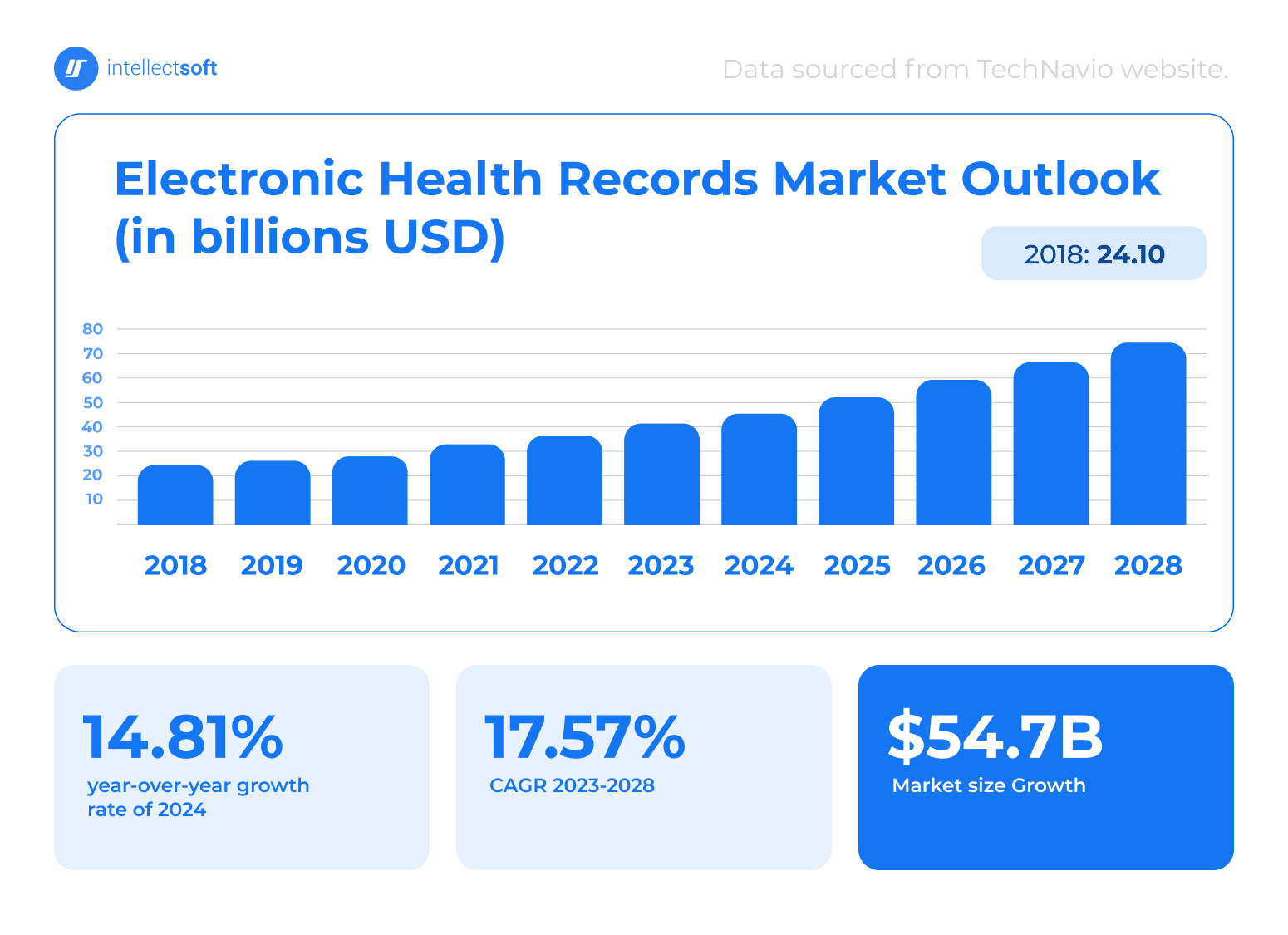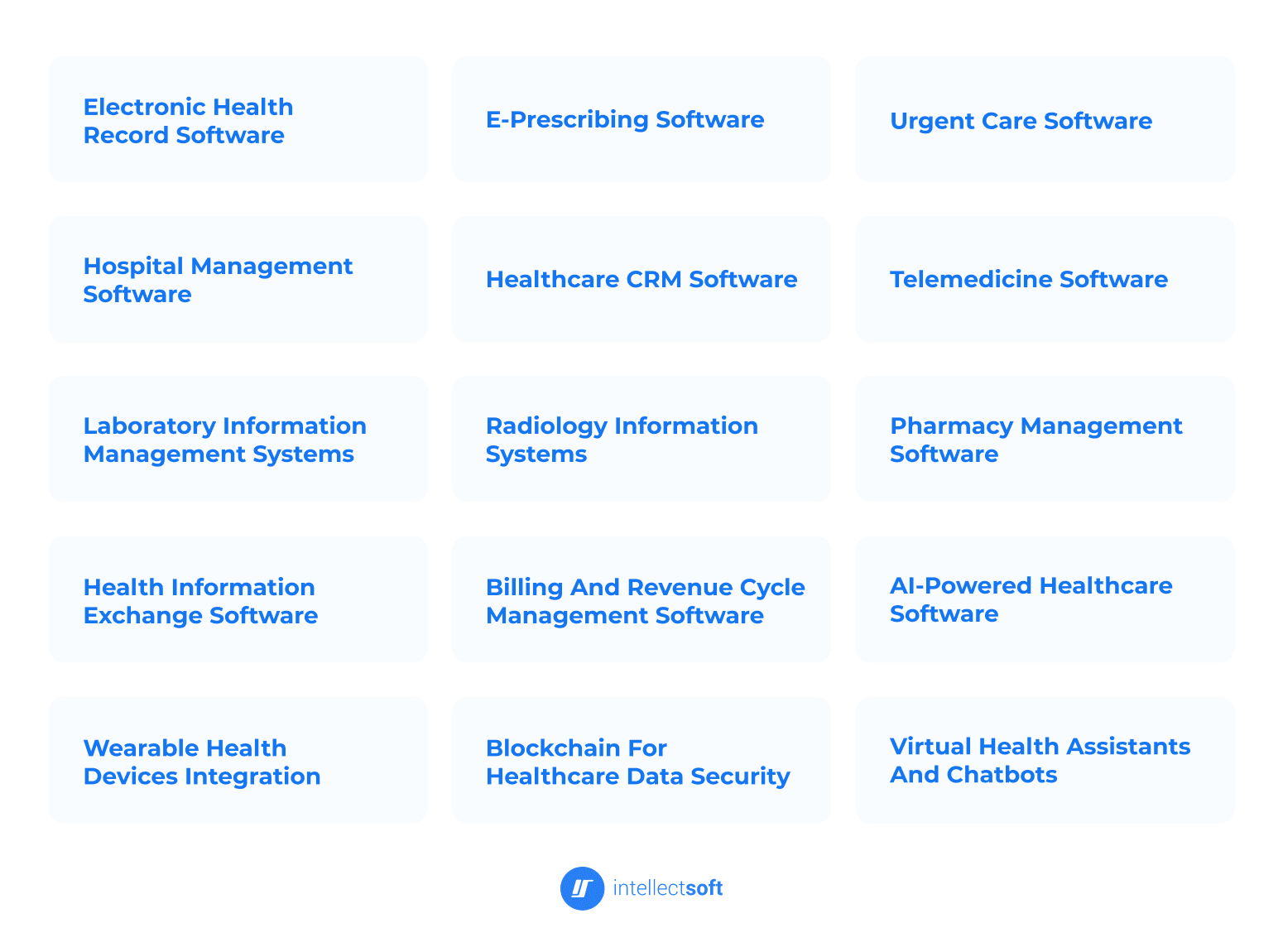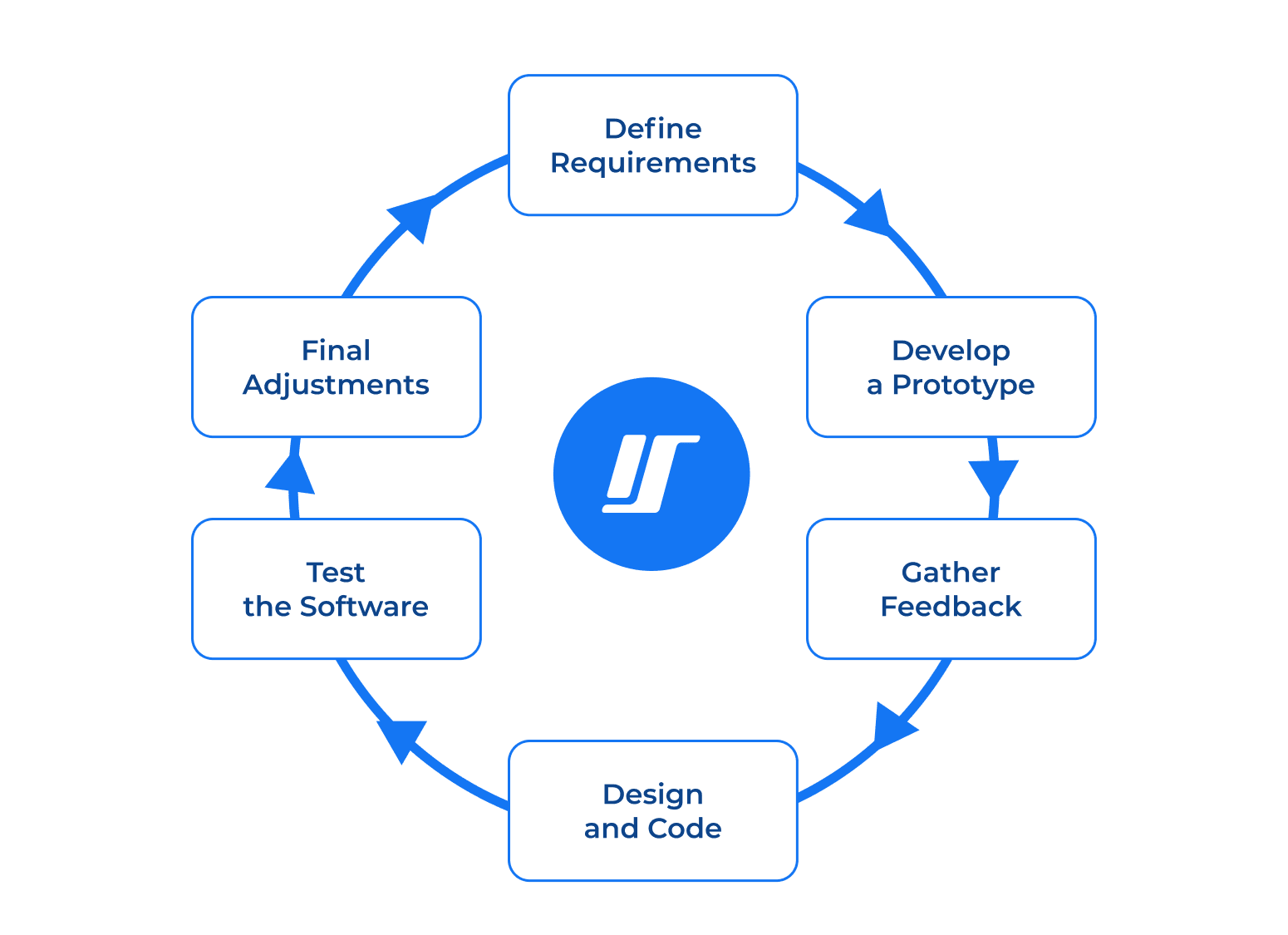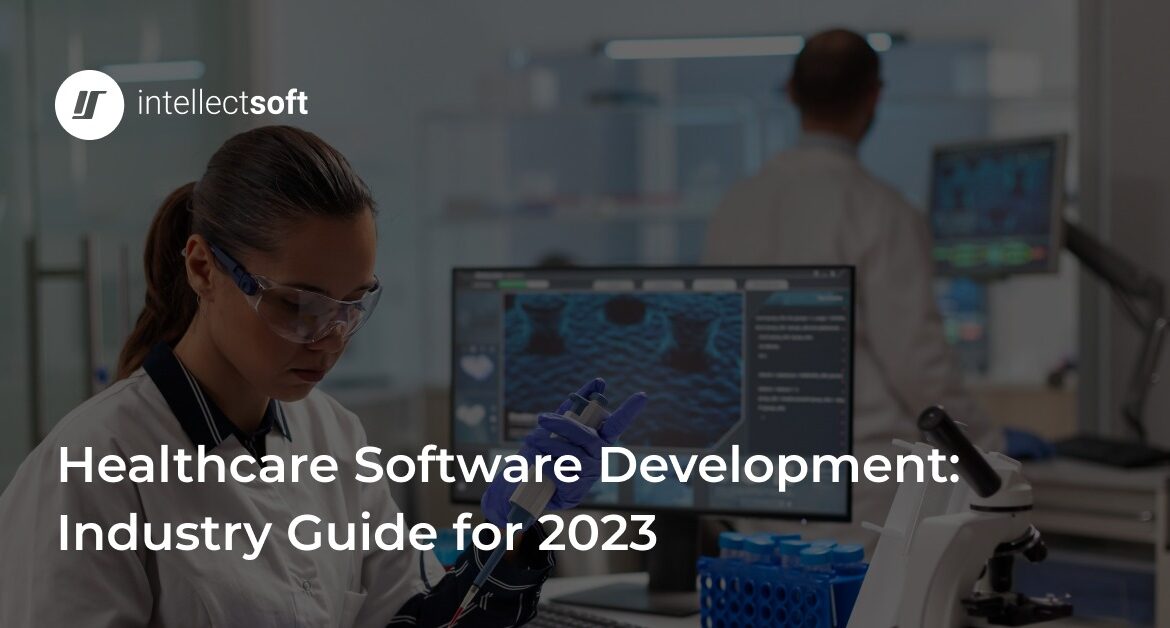Updated: November 28, 2024
The global healthcare software market is anticipated to reach nearly $981.5 billion by 2032, driven by increasing demand for digital health technologies such as SaaS, cloud computing, telemedicine, wearable technology, and health monitoring apps, according to Global Market Insights. This growth highlights the crucial role of software development. Gartner also highlights the rising adoption of artificial intelligence, telemedicine software, and generative AI by healthcare payers and providers as key factors propelling this growth. The market is expected to continue its strong expansion through 2025, with North America and Asia-Pacific leading the way. Healthcare software development is crucial in driving these advancements, helping healthcare professionals leverage innovative technologies to enhance care delivery.

Source: Electronic Health Records Market Analysis Report 2024-2028
The healthcare software landscape is rapidly evolving, driven by advances in artificial intelligence and the Internet of Things. These innovations enable seamless data sharing and process automation, leading to more efficient and accessible healthcare platforms.
Telemedicine, for example, has experienced substantial growth and is now expected to generate over $400 billion by 2030, highlighting its increasing role in healthcare delivery, according to Grand View Research. As these technologies enhance accessibility and usability, healthcare organizations are turning to AI-driven solutions more frequently. The AI healthcare market is projected to reach $148.4 billion by 2029, as reported by MarketsandMarkets.
This article will dive into the current state of healthcare software development, examining the impact of these technologies and offering predictions for the future. Understanding these trends will help healthcare organizations harness these platforms to improve efficiency and enhance patient care in the healthcare industry. Moreover, software development plays a crucial role in creating these innovative solutions.
What is Healthcare Software Development?
Healthcare software development involves creating platforms that manage the complex interactions and administrative tasks between patients, healthcare professionals, and administrators. These healthcare systems focus on streamlining communication, enhancing care quality, and ensuring the privacy and accuracy of records across hospitals, clinics, research labs, financial services, and medical equipment providers.
As technology evolves, so does the healthcare ecosystem, with software development that enhance service delivery, improve diagnostic accuracy, and streamline administrative processes. Machine learning has accelerated the development of these systems, particularly in areas such as digitizing patient records and improving diagnostics. Innovations in Big Data and e-health have also significantly transformed healthcare software development, enabling more efficient and effective patient care.
Main Types of Healthcare Software Development

The software development landscape in the healthcare industry is undergoing significant transformation, driven by technological advancements that improve patient care, streamline operations, and enhance data security. From Electronic Health Records to AI-powered diagnostics, healthcare platforms are revolutionizing the industry. We’ll explore the key types of healthcare technologies and software development, highlighting their roles in improving clinical workflows, patient engagement, and overall operational efficiency. These innovations are reshaping how healthcare providers deliver care, making the healthcare industry more accessible, efficient, and secure.
Electronic Health Record Software
EHR software helps healthcare providers manage patient data electronically, including medical history, allergies, lab results, and demographics. It can also integrate with ERP systems for broader functionality, enhancing the capabilities of healthcare organizations. This integration cam improve the overall efficiency and functionality of healthcare services.
E-Prescribing Software
E-prescribing enables healthcare providers to send prescriptions directly to pharmacies, enhancing convenience for patients and strengthening connections within healthcare systems. This advancement streamline workflows and enhancing patient care.
Urgent Care Software
This category encompasses apps that enable patients to receive emergency care remotely, reducing the need for in-person visits to a doctor’s office. These apps are designed to enhance care delivery and patient convenience.
Hospital Management Software
Healthcare software like hospital management solutions streamlines operations, including billing, insurance processing, patient data management, and administrative tasks, improving hospital efficiency through effective software solutions.
Healthcare CRM Software
Custom healthcare software such as CRM systems helps healthcare organizations maintain strong patient relationships by managing contacts, improving care quality, and providing performance insights.
Telemedicine Software
Telemedicine platforms allow healthcare professionals to diagnose and treat patients remotely via video conferencing and file-sharing, expanding access to care. These solutions also enable real-time monitoring and follow-up, improving patient engagement and continuity of care.
Laboratory Information Management Systems
Healthcare software like LIMS enhances the accuracy of lab results by managing sample data, automating workflows, and integrating instruments, improving overall lab efficiency.
Radiology Information Systems
RIS streamlines radiology department workflows by tracking patient imaging, scheduling appointments, managing results, and handling billing.
Pharmacy Management Software
Healthcare software like pharmacy management systems ensures smooth operations by tracking inventory, managing expired medications, and providing reminders for refills, contributing to better patient safety and efficiency.
Health Information Exchange Software
HIE software enables the secure exchange of patient health information between healthcare providers, improving collaboration, care speed, and reliability through custom platforms.
Billing and Revenue Cycle Management Software
This software tracks billing and revenue throughout the patient lifecycle, optimizing financial operations for healthcare providers. It streamlines processes through smart software development integration.
AI-powered Healthcare Software
AI is revolutionizing healthcare by enhancing diagnostics, predicting outcomes, and optimizing administrative tasks, making clinical processes more efficient and accurate through custom healthcare software.
Wearable Health Devices Integration
Healthcare software is increasingly integrating with wearables, enabling real-time health monitoring and personalized care, fostering proactive healthcare management.
Blockchain for Healthcare Data Security
Blockchain technology is enhancing patient data security by ensuring encrypted, tamper-proof data exchanges between healthcare providers.
Virtual Health Assistants and Chatbots
AI-driven chatbots and virtual assistants are improving patient engagement by answering health questions, scheduling appointments, and offering basic medical advice.
What Do Healthcare Software Development Companies Do?
With the increasing demand for tech-driven solutions in healthcare, specialized healthcare software development companies have become essential players in optimizing healthcare delivery. These companies partner with hospitals, medical organizations, and research institutions to improve operational efficiency, enhance patient care, and streamline administrative tasks through innovative software development.
The primary motivation for healthcare organizations to adopt IT solutions is often cost efficiency. By leveraging technology and healthcare software development, healthcare providers can make data-driven decisions, reduce operational costs, and enhance financial performance.
Here’s a breakdown of the main services software development companies provide:
Healthcare Software
These technologies are designed to improve patient care and operational management through effective software development, such as:
- AI-powered diagnostics
- Radiology and imaging enhancements
- Operations and resource management
- Ensuring security and regulatory compliance
Healthcare Apps
Healthcare apps focus on improving patient interaction and monitoring, such as:
- Telehealth services and remote monitoring
- Virtual health assistants and AI-driven chatbots
- Personalized treatment using AI
- Tools for patient engagement and self-care
Custom Solutions
Tailored healthcare software designed to address specific business needs, including:
- Supporting digital transformation
- Implementing AI and machine learning
- Facilitating secure data exchanges and integration
Ultimately, custom healthcare software development aims to build a cohesive healthcare ecosystem. Top-tier companies offer a wide range of services, including IT consulting, mobile/web development, cloud solutions, and IT outsourcing. While the digital transformation of healthcare presents challenges, a reliable software partner helps navigate these obstacles, providing customized solutions that meet the unique needs of each organization. At Intellectsoft, we offer expert guidance on selecting the right technology and strategies to ensure successful implementation and long-term success.
Cost of Software Development in the Healthcare Industry
The cost of healthcare software development in 2025 is influenced by several factors such as the complexity of the software, regulatory compliance, and the integration of advanced technologies like AI and blockchain. According to Gartner’s research on healthcare digital transformation, there is an increasing demand for sophisticated healthcare software as organizations strive to meet new business needs and adapt to emerging trends. Furthermore, the overall healthcare technology landscape requires significant investment in cybersecurity, compliance with healthcare standards, and user-centered design for custom healthcare software solutions. Intellectsoft, recognized by GoodFirms as a leading custom software development company and included in the Global Outsourcing 100, is well-positioned to support these critical areas with tailored software solutions that address the unique challenges of the healthcare sector.
The cost of healthcare software development varies based on factors like team type, size, project complexity, timeline, and location. Each of these elements affects both the final cost and the software development quality. Consider all these when planning your budget to ensure optimal value. Get in touch for a custom quote and insights into your software development needs.
Type of Collaboration
Software development projects start with choosing the right type of team. In-house teams offer close collaboration, but they also come with higher costs. Outsourcing can deliver the same quality for less, making it a popular choice among healthcare organizations for software development.
Team Composition
Healthcare software development involves significant cost factors related to the team’s size and expertise. A larger, more experienced team with a complex technology stack will increase costs but can add specialized skills for advanced projects, especially in medical software development.
Project Complexity
Healthcare organizations should be aware that the software’s complexity directly impacts cost. Advanced features, custom designs, and complex integrations require more time and resources, increasing the budget for solution development.
Development Timeline
This factor is closely tied to the complexity of the software development itself. The more intricate your healthcare software solutions need to be, the longer and more costly the project is likely to become, requiring advanced software development.
Team Location
Software development costs vary by region. Outsourcing to areas with lower labor costs can save money, but American-based teams offer advantages in communication, regulatory familiarity, and faster turnarounds for healthcare software.
SDLC in Healthcare

Here’s a more detailed look at the steps involved in the software development process and considerations for custom healthcare software solutions.
Define Requirements
Begin by understanding the organization’s needs and goals for the software, gathering input from stakeholders like doctors, administrators, and IT staff. For healthcare software, consider regulatory requirements such as HIPAA or GDPR, and ensure seamless integration with existing healthcare systems through efficient software development practices.
Develop a Prototype
Create a basic prototype or mock-up to refine ideas and assess feasibility, ensuring the foundational concepts align with clinical and operational needs in healthcare software development.
Gather Feedback
Engage stakeholders to review and provide input on the prototype. Getting feedback from end-users, like healthcare providers or administrators, ensures the design is intuitive and aligns with actual workflows in healthcare software, reducing the risk of later revisions.
Design and Code
Once the prototype is approved, move to software development, designing and coding the solution with a user-friendly interface and key features like secure login, data encryption, and interoperability with healthcare systems. These are vital for usability and compliance in healthcare software.
Test the Software
Perform thorough testing to verify the software’s stability, functionality, and performance. Testing in healthcare software development is critical for identifying and resolving errors, bugs, or vulnerabilities that could compromise data security or user safety.
Final Adjustments
Make final tweaks to address remaining issues and conduct a final review to ensure compliance with healthcare regulations. This phase often involves certification or validation checks to ensure the software meets industry standards in healthcare software development before deployment.
For custom healthcare software, additional steps tailor the software to specific client needs:
Identify the Target Audience
Define user personas based on patient demographics, practitioner needs, or administrative functions. This helps prioritize features and design elements that cater directly to the users’ requirements and pain points, a crucial step in software development for the healthcare industry.
Plan the Architecture
Build a detailed architecture that outlines technical specifications, data handling, and integration pathways to ensure seamless performance. A customized approach in healthcare software allows for scalability, enabling future updates or integrations as needs evolve, and supporting efficient software development.
Incorporate Feedback
Gather feedback on each iteration to maintain alignment with client goals and avoid potential mismatches in functionality or design, ensuring the success of custom healthcare software.
Design the UI/UX
Prioritize a user-friendly interface that simplifies complex workflows and enhances accessibility. Usability is especially important in healthcare software to accommodate users with varying levels of tech proficiency, a key focus in medical software development.
Secure the Solution
Healthcare software solutions must ensure strong data encryption and user authentication to protect sensitive medical data and patient privacy. Adhering to high standards of cybersecurity is essential to prevent data breaches or unauthorized access, a critical component of software development.
Verify Compatibility
Test the software’s compatibility within the healthcare organization’s existing IT environment. This ensures it integrates smoothly with other systems without creating workflow disruptions, a key consideration in custom healthcare software development.
What’s the Future of Healthcare Software Development?
The healthcare software development landscape is evolving with a focus on open, secure platforms, personalized care, and seamless data sharing. As technology advances, the healthcare industry is enhancing patient-centric solutions, optimizing treatment, and enabling remote support. Here’s a look at the key trends shaping the future of healthcare software:
Self-Care and Patient Portals
Healthcare solutions are focusing on accessibility, with features like patient portals enabling remote care, health record management, and communication, tailored to diverse patient needs through healthcare software development.
Blockchain for Data Security
Blockchain’s role in healthcare software is expanding, offering a decentralized, transparent method to manage sensitive data. This enhances trust and collaboration among patients, providers, and stakeholders, while ensuring privacy through secure software development.
Advanced Electronic Medical Records
Future EMR systems aim to integrate all patient records across specialties, facilitating seamless information flow and improving care coordination through healthcare software.
Telemedicine
Software development is enabling virtual care to eliminate geographic barriers, making healthcare accessible to more patients. The expansion of telemedicine allows healthcare providers to monitor patient progress, make remote diagnoses, and provide consultations, all while reducing costs and wait times through healthcare software.
Artificial Intelligence
AI is transforming diagnostics and personalized care, enabling healthcare providers to create tailored treatment plans and more accurately identify conditions, ultimately improving outcomes through healthcare software development.
Virtual Reality and Augmented Reality
These technologies are revolutionizing training for healthcare professionals and enhancing patient education through software development. VR and AR applications are emerging for medical simulations, therapy, and in guiding patients through complex treatment processes, driving innovation in healthcare software.
Chronic Disease Management Tools
Mobile applications and wearable devices play an essential role in managing chronic conditions, especially as the population ages. By tracking vital health metrics, these tools provide patients and providers with continuous insights, helping prevent complications and improve quality of life through custom healthcare software.
While these trends promise advancements, challenges remain in ensuring data security and managing large datasets. As healthcare software evolves, robust data protection and responsible big data handling will be critical. Effective software development and secure healthcare software solutions are key to building trust and unlocking the potential of digital health.
Final Thoughts on Healthcare Software
The future of healthcare software development is being shaped by advancements in AI, IoT, telemedicine, and blockchain, all of which are improving patient care, operational efficiency, and data security. As these technologies evolve, healthcare organizations need to work with experienced developers to stay ahead and build more connected, efficient, and patient-focused healthcare software solutions. This shift is transforming the healthcare industry, requiring innovative software development to meet new challenges and enhance overall care delivery.
Intellectsoft is a leading healthcare software development company, delivering top-tier expertise in designing and developing custom software development services tailored to meet diverse industry needs. By working with us, you gain a reliable solution that integrates seamlessly into your digital ecosystem and supports precise data management for long-term success.
At Intellectsoft, we empower companies with transformative, data-driven digital solutions. Our work spans various healthcare organizations, including the dental sector, where our healthcare software development solutions have helped increase revenue and attract new patients.
Ready to elevate your organization with innovative software development solutions? Connect with our experts to explore the latest in healthcare software development technologies and see how they can drive your business forward.
What is healthcare software development and why should I choose Intellectsoft for our organization?
Healthcare software development is an overarching platform that helps streamline the many activities and interactions that take place daily in the healthcare industry. It allows the easy and secure storage and exchange of patient data.
At Intellectsoft, we’ll determine the best fit for you and use our vast range of technologies to address your unique needs. From end-to-end integrations to cloud solutions, we’ve got what you need for your healthcare software solution.
What are the main offerings of healthcare software development companies like Intellectsoft?
Healthcare software development companies typically offer solutions like data storage and exchange, medical invoicing systems, CRMs, and other tools that increase healthcare interactions’ speed, safety, and efficiency.
At Intellectsoft, we help our clients adapt digital-first strategies and grow their businesses by providing full-cycle, end-to-end software development services. Our custom approach includes consulting, engineering, and support while implementing our IoT, mobile, and blockchain services. Reach out to check our offerings today!
How has software development in healthcare evolved in recent years?
In recent years, medical software development has evolved to include client personalization through AI, AR, and VR to help patients learn about their conditions and manage them better, machine learning to make predictions about patient outcomes and the expansion of telemedicine to allow better accessibility for all.
At Intellectsoft, we constantly stay on the cusp of innovations and are always ready with customized solutions to meet our client’s needs, big or small. With our flexibility, maximum personalization, and 360-degree approach, we’ll zero in on what you need to achieve your organizational goals.
Should I use nearshore or offshore healthcare software development?
When considering which vendor to pick for your software development for healthcare, it’s essential to know the difference between nearshore and offshore. Offshore means your team or vendor would be from another country and a different time zone.
On the other hand, a nearshore development company might be from another country. Still, they are usually adjacent to your country and in the same time zone, making communications more accessible.
Choosing a nearshore option for a healthcare software developer like Intellectsoft will save you money and allow you to overcome any cultural differences you might encounter from offshore counterparts.
Subscribe to updates
Source link







